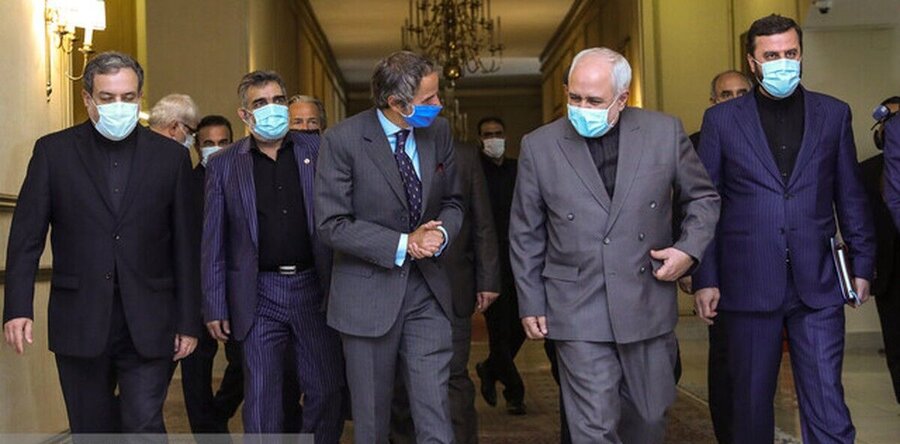Speaking in an interview with the website of the Strategic Council on Foreign Relations, Diako Hosseini referred to the International Atomic Energy Agency position on inspections of Iran’s nuclear facilities and ignoring its other operational responsibilities towards Iran and said: The issue of inspections is very important for the IAEA, but the reality is, however, that this international institution does not have enough independence and is just a tool.
He added: Unfortunately, the International Atomic Energy Agency is affected by the political needs of different countries and major powers, and to date we have not seen an independent stance by that institution on various issues related to Iran.
IAEA’s evasion of its responsibilities damages cooperation
The international affairs analyst stressed: Normally, when Iran has accepted the most complete and comprehensive inspections possible among all countries, it should have security against cyber or illegal physical attacks by others, but the Agency’s evasion of its responsibilities in relation to Iran could seriously damage cooperation between Iran and the IAEA in the medium term as well as its credibility and professional performance.
Expressing the hope for a change in the attitude of that international organization towards Iran, he referred to the recent incident in one of the industrial complexes of Natanz nuclear site and continued: Those attacks have taken place in the past and experience has shown that such actions cannot hinder Iran’s progress.
The international affairs analyst explained that the IAEA’s existence and performance are largely driven by a political fuel, noting: For at least the last two decades, the issue of Iran’s nuclear program has been at the top of the priorities of the IAEA’s agenda, while there are countries that, despite their nuclear activities and even nuclear weapons, are not even members of the NPT and no strict inspection regime is conducted in their case.
Political and non-professional motives of the IAEA
Hosseini continued: There are regimes and countries that have civilian nuclear activities, but some aspects of those activities are unknown to others; however, the Agency has not put them at the forefront of its activities; therefore, unfortunately, the reason for pursuing an issue for that international body is the political motives and political atmosphere that prevail in international relations, and it is those motives that move the Agency forward.
Part of IAEA inaction influenced by approach of powers
Emphasizing that part of the IAEA’s inaction is influenced by the powers, he added: The United States and the nuclear powers in particular, and mainly Western countries, were reluctant to condemn, for example, the attacks on Iran’s Natanz site or take a decisive action against it; therefore, the Agency naturally follows this political practice, as it has done for years.
Regarding the consequences of the International Atomic Energy Agency’s political and non-professional approaches and its impact on Iran-IAEA relations, as well as the Joint Comprehensive Plan of Action (JCPOA) talks, Hosseini said: Of course, this issue can be the prelude to a new crisis in relations between Iran and Western countries, especially the United States; however, actually the main culprit has been the United States in getting to that point; because he it withdrew the JCPOA and was not willing to lift the sanctions in this new period and return to the agreement.
Referring to the law passed by the Majlis on lifting nuclear restrictions and reducing the access of inspectors, he continued: If, according to this law and the agreement reached between Iran and the IAEA, the sanctions are not lifted within a certain period of time, of which not much has been left, and the JCPOA is not fully revived, part of the IAEA inspection regime on Iran’s nuclear activities will automatically be damaged, and part of the monitoring will be removed.
Reduction of cooperation due to poor performance of the agency and Western parties
Director of the Global Studies Program of the Presidential Center for Strategic Studies stressed: Unfortunately, due to the poor performance of the IAEA and Western parties in the JCPOA, we are on that path, and lack of adherence of the United States and other IAEA parties to their commitments leads us in the direction of reducing relations between Iran and the IAEA in accordance with the JCPOA and the Additional Protocol and could create a new round of tensions between Iran and the IAEA.
Hosseini said that sabotage could accelerate this negative trend, adding: Certainly, the crisis in Iran-IAEA relations and the damage to cooperation in the medium term is not in the interest of either side, because it will put Iran and the West into a new phase of crisis. Neither side can define this crisis and this reduction in cooperation as a political benefit for itself.
According to the international affairs analyst; only the Zionist regime and its allies will benefit the most from this situation.










0 Comments